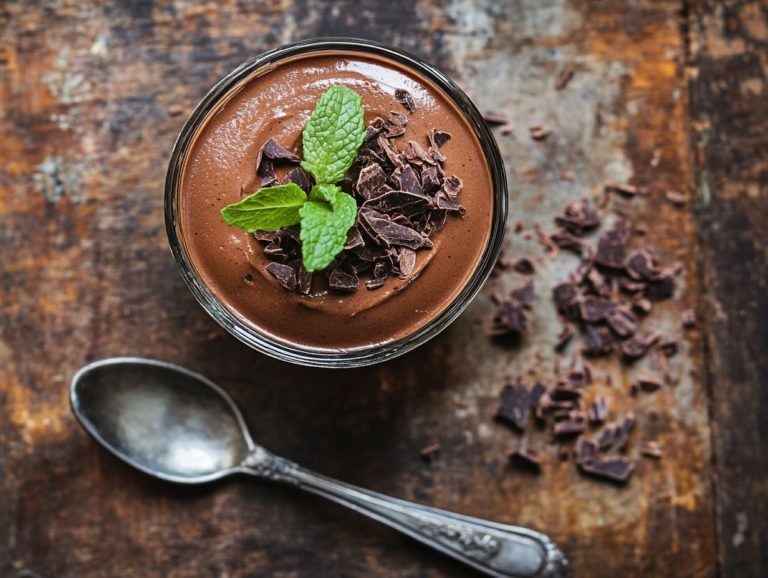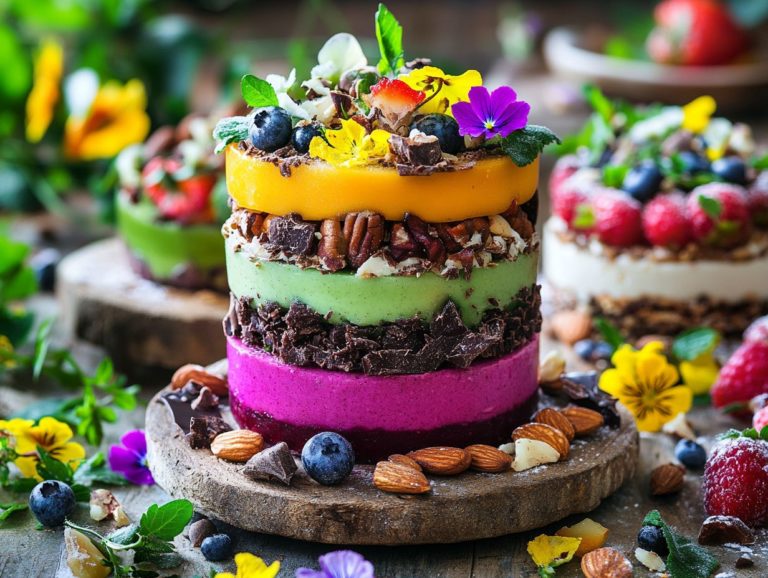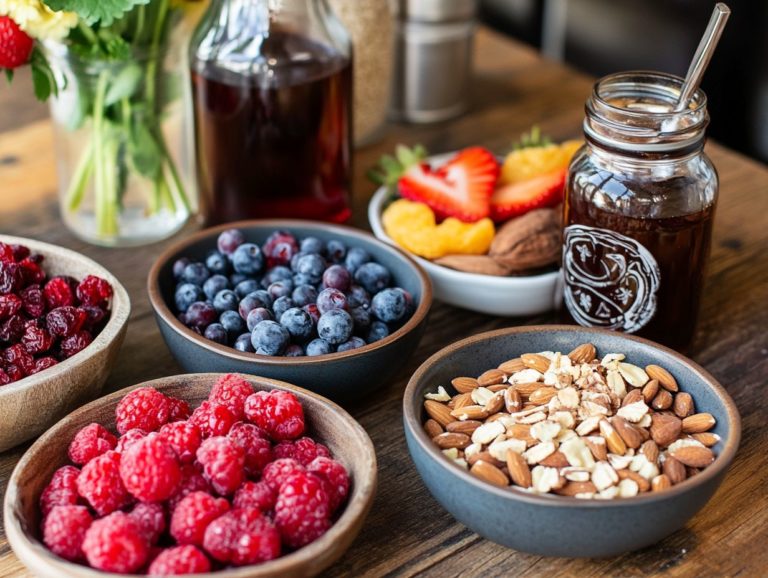The Environmental Impact of Raw Desserts
Explore the world of raw desserts and discover how they can transform your dessert experience! In recent years, raw desserts have captured the hearts of health-conscious individuals and eco-enthusiasts alike. These delectable treats delight your palate and prompt important discussions about their environmental impact and carbon footprint.
As you delve into the rising popularity of raw desserts, you’ll uncover their environmental effects on our planet and discover sustainable alternatives that truly make a difference. Join in as you explore the benefits of opting for environmentally friendly dessert choices and learn how you can indulge without compromising your values.
Contents
- Key Takeaways:
- What Are Raw Desserts?
- Why Are Raw Desserts Popular?
- What Are the Environmental Impacts of Raw Desserts?
- How Do Raw Desserts Impact the Environment?
- What Are the Sustainable Alternatives to Raw Desserts?
- What Are the Benefits of Choosing Sustainable Dessert Options?
- What Are Some Examples of Sustainable Dessert Options?
- How to Reduce Environmental Impact When Enjoying Desserts
- 3. Use Reusable Containers and Utensils
- 4. Support Sustainable Brands and Companies
- Frequently Asked Questions
- What is the environmental impact of raw desserts?
- How do raw desserts contribute to resource depletion?
- What types of pollution are associated with the production of raw desserts?
- Are raw desserts a more environmentally friendly option compared to traditional desserts?
- How can I reduce the environmental impact of my raw desserts?
- What other steps can I take to make my raw desserts more environmentally friendly?
Key Takeaways:
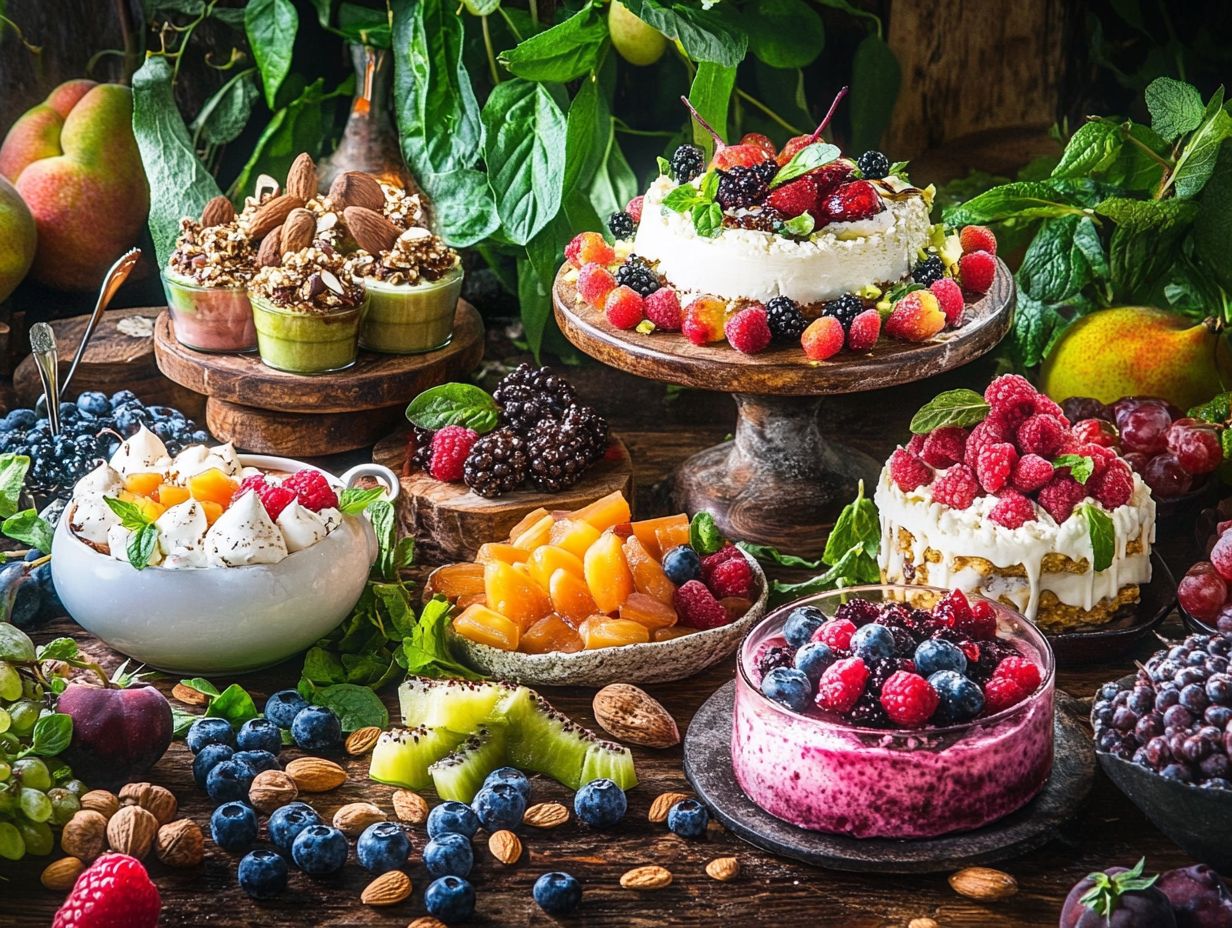
- Choose sustainable vegan dessert options to reduce your carbon footprint and promote biodiversity.
- Support local and organic farmers by opting for seasonal fruit and plant-based desserts.
- Reduce waste and pollution by making homemade treats and using reusable containers and utensils.
What Are Raw Desserts?
Raw desserts are innovative and delightful treats that prioritize natural ingredients. They often showcase a harmonious blend of fruits, nuts, and sweeteners like maple syrup and agave. These have become a popular choice for those embracing plant-based or vegan lifestyles.
Unlike traditional desserts that rely on refined sugars and animal products, raw desserts are typically unbaked. This preserves their nutritional value while offering an enticing array of flavors and textures that can satisfy even the most discerning sweet tooth. Popular choices include vegan options like lemon poppy seed cake and peanut butter cookies.
Renowned establishments like Greyston Bakery have earned their reputation by crafting exquisite raw options. They offer decadent chocolate mousse, nice cream, and creamy cheesecake bars that elevate the dessert experience.
Why Are Raw Desserts Popular?
Raw desserts have experienced a remarkable rise in popularity, seamlessly fitting into health-conscious trends that prioritize natural, nutrient-rich foods. This trend resonates particularly well with those embracing vegan and plant-based diets.
Consumers are increasingly aware of the many health benefits associated with raw desserts. These include enhanced digestive health, effective weight management, reduced inflammation, and a lower risk of chronic diseases like heart conditions.
The vibrant flavors and striking colors of these desserts, combined with their ability to satisfy sweet cravings without guilt, have made them a beloved choice among people of all ages.
What Are the Environmental Impacts of Raw Desserts?
The environmental impacts of raw desserts are complex and nuanced, encompassing sustainability, resource usage, and agricultural practices. When you choose raw desserts that feature whole foods like fruits, nuts, and legumes such as chickpeas, you can positively influence environmental conservation efforts especially when those ingredients are sourced sustainably.
Opting for plant-based components generally results in a lower carbon footprint compared to their animal-derived alternatives. This supports water conservation and the preservation of biodiversity. Raw desserts thus become an excellent choice for the eco-conscious consumer who values both indulgence and sustainability. Consider using fruits like mangoes and strawberries to enhance both flavor and nutritional value.
How Do Raw Desserts Impact the Environment?
Raw desserts have the potential to make a meaningful impact on the environment by using ingredients sourced through sustainable practices, ultimately reducing their overall carbon footprint. For example, using organic nuts and eliminating palm oil can greatly benefit environmental conservation efforts.
The choice of ingredients is crucial in determining the environmental impact of these delectable treats. By opting for organic nuts and fruits grown without synthetic pesticides and fertilizers you not only foster biodiversity but also contribute to healthier soil and ecosystems.
When you choose local produce, you significantly cut down on transportation emissions, making a substantial difference in sustainability. Selecting sweeteners from responsibly managed sources can further diminish your environmental impact.
Every decision you make in sourcing ingredients reflects a commitment to a more sustainable future, illustrating how mindful choices in the preparation of raw desserts can create a positive ripple effect on the environment.
What Are the Sustainable Alternatives to Raw Desserts?
Sustainable alternatives to traditional desserts open the door to a wealth of plant-based recipes that celebrate local and seasonal ingredients, emphasizing eco-friendliness and minimizing detrimental environmental impacts.
Imagine indulging in delightful options like avocado chocolate mousse, vegan Snickers cake, or luscious peach sorbet crafted from locally grown fruits. These treats not only excite your taste buds but also provide vital support to regional farmers.
By opting for desserts that feature ingredients harvested at their peak, you effectively reduce the carbon footprint linked to long-distance transportation. Seasonal selections allow you to savor flavors at their freshest while contributing to the preservation of biodiversity.
Consider using heirloom varieties of fruits; this choice promotes diverse agricultural practices that enhance soil health and lessen reliance on pesticides. By embracing these sustainable dessert alternatives, you contribute to nurturing the planet and paving the way for a brighter, greener culinary future.
What Are the Benefits of Choosing Sustainable Dessert Options?
Opting for sustainable dessert choices brings a host of advantages, enhancing not just your health but also contributing positively to the environment and invigorating local economies.
By indulging in desserts crafted from organic, plant-based ingredients, you can reap health benefits like improved digestive function and effective weight management, all while lowering your carbon footprint.
Supporting local and organic farmers helps promote biodiversity and reduce waste. This approach to dessert is truly a win-win, benefiting both your well-being and the planet.
1. Reduces Carbon Footprint
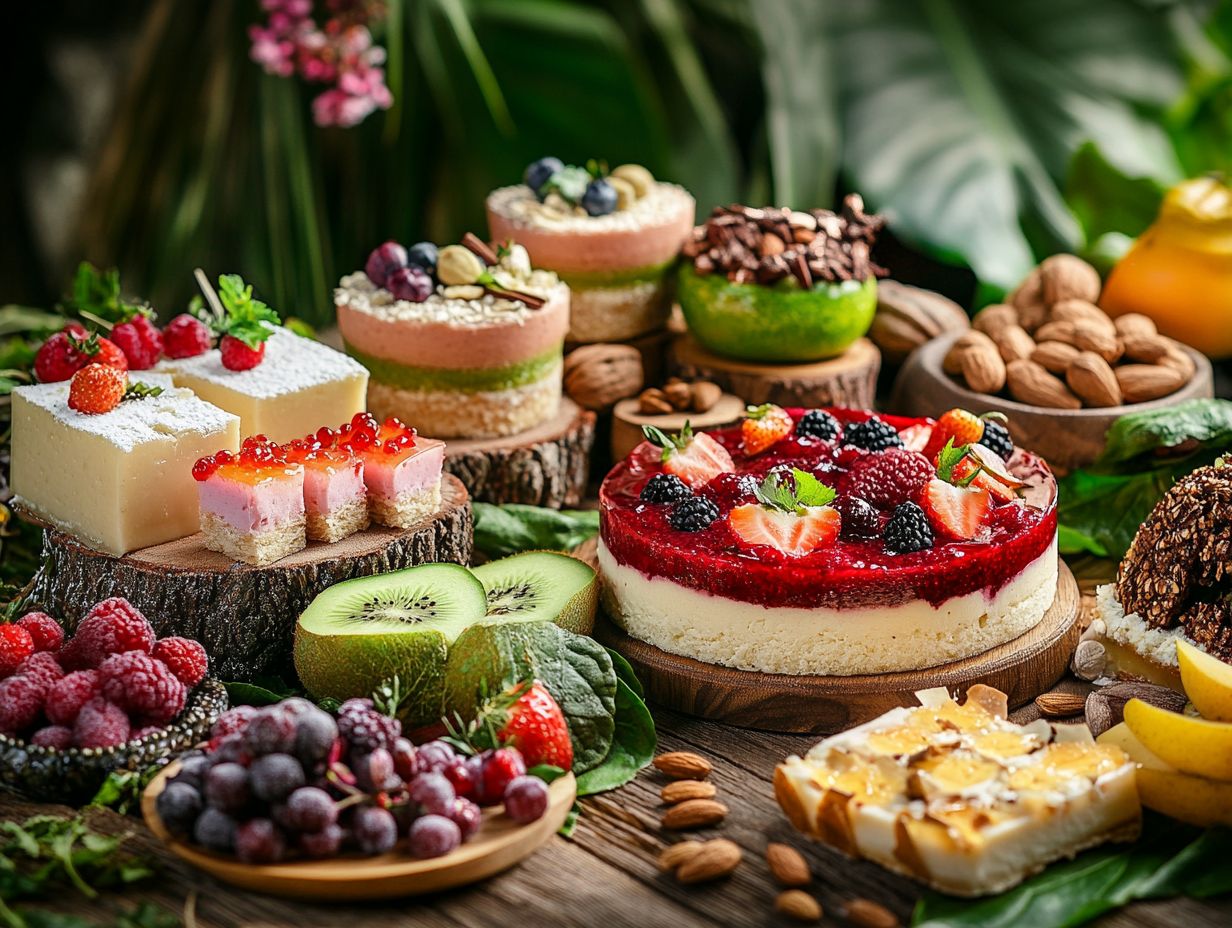
Choosing sustainable desserts offers you a remarkable opportunity to significantly reduce your carbon footprint by opting for plant-based ingredients instead of traditional animal-derived products.
Research shows that animal agriculture accounts for nearly 14.5% of global greenhouse gas emissions, whereas plant-based alternatives typically make a much lighter impact. In fact, a study reveals that embracing a vegan diet could slash an individual’s carbon footprint by up to 50%. This is largely due to the lower emissions generated during the cultivation of legumes and grains.
Prioritizing local and seasonal ingredients further diminishes your environmental impact. Consider the emissions that come from transporting food over long distances; they can be substantial. By choosing locally sourced ingredients, you not only support local economies but also enjoy fresher, more flavorful desserts that leave a lighter ecological footprint.
This holistic approach to sourcing ingredients truly elevates your commitment to sustainability and wellness.
Empower Local and Organic Farmers Through Your Dessert Choices
Choosing sustainable dessert options boosts local and organic farmers by creating demand for their high-quality, ethically sourced ingredients.
This decision nurtures the environment with reduced pesticide use and improved soil health. It also fosters a sense of community as you connect with the farmers who grow your food.
When you buy organic ingredients, you enjoy fresher produce, enhancing the flavor and nutrition of your desserts. This practice supports a resilient food system for future generations.
Promote Biodiversity
Sustainable dessert options elevate your desserts and promote biodiversity. By embracing a variety of ingredients, you help maintain healthy ecosystems.
Using a mix of fruits, nuts, and grains not only enhances flavors but also contributes to healthier soil and reduces reliance on monoculture farming.
Incorporating quinoa or ancient grains like spelt can improve soil retention and biodiversity. Desserts with seasonal fruits like berries or stone fruits support local agriculture.
This thoughtful approach delights your palate while showing commitment to ecological balance. Ensuring a robust agricultural system benefits both the environment and your taste.
Reduce Waste and Pollution
Embracing sustainable dessert practices reduces waste by using overlooked ingredients, fostering a circular economy.
Incorporate surplus fruits or vegetable scraps into recipes to create delightful treats. For example, turn overripe bananas into banana bread.
Composting enhances soil quality and reduces methane emissions by keeping organic waste out of landfills. Choose eco-friendly packaging to further minimize your impact.
Adopting these approaches cultivates a deeper appreciation for resourcefulness in the culinary world.
What Are Some Examples of Sustainable Dessert Options?
Explore sustainable dessert options that tantalize your taste buds. Think of seasonal fruit desserts that celebrate local produce.
Consider treats made with locally-sourced ingredients. Desserts featuring strawberries or avocados offer delightful flavors and lower environmental impact.
Indulging in these options lets you enjoy your sweet tooth guilt-free, knowing you re making a positive impact while supporting biodiversity and water conservation.
1. Seasonal Fruit Desserts
Seasonal fruit desserts serve as an exquisite example of sustainable options, showcasing the freshest local produce available throughout the year. By indulging in these delights, you not only savor exceptional flavors but also support your community while minimizing transportation emissions.
Embracing the natural cycles of various fruits transforms these desserts into culinary experiences that tantalize your taste buds and contribute to a healthier planet. In spring, you might relish a slice of strawberry shortcake or savor a tangy rhubarb pie. As summer unfolds, the season calls for a refreshing peach cobbler or a vibrant watermelon sorbet. When fall arrives, the warm spices of apple crisp and pumpkin pudding celebrate the bountiful harvest, gracefully transitioning to cozy citrus tarts in winter.
Incorporating these fruits into your desserts enhances not just nutrition but also promotes biodiversity. Local farming practices generally require fewer resources and generate less waste, making these seasonal treats a delightful win-win for both your palate and the environment.
2. Plant-based Desserts
Plant-based desserts, like chocolate mousse made with avocados or nice cream crafted from bananas, present delectable and healthy alternatives that cater to your vegan and health-conscious desires.
These treats not only satisfy your sweet cravings but also come loaded with nutritional benefits, making them perfect for anyone striving to maintain a balanced diet. For example, avocados provide healthy fats and fiber, while bananas deliver natural sweetness along with potassium and essential vitamins. Additionally, they help in weight management and digestive health, and contribute to reduced inflammation.
By incorporating ingredients such as chia seeds, nuts, and plant-based milks, you can enhance the nutritional value and promote your overall well-being. Options like coconut cream and almond butter add a luxurious texture and elevate the flavor profile, ensuring that these desserts are not just wholesome but also indulgently guilt-free. Using whole foods and natural sweeteners like maple syrup further boosts their health benefits.
3. Locally-sourced Ingredients
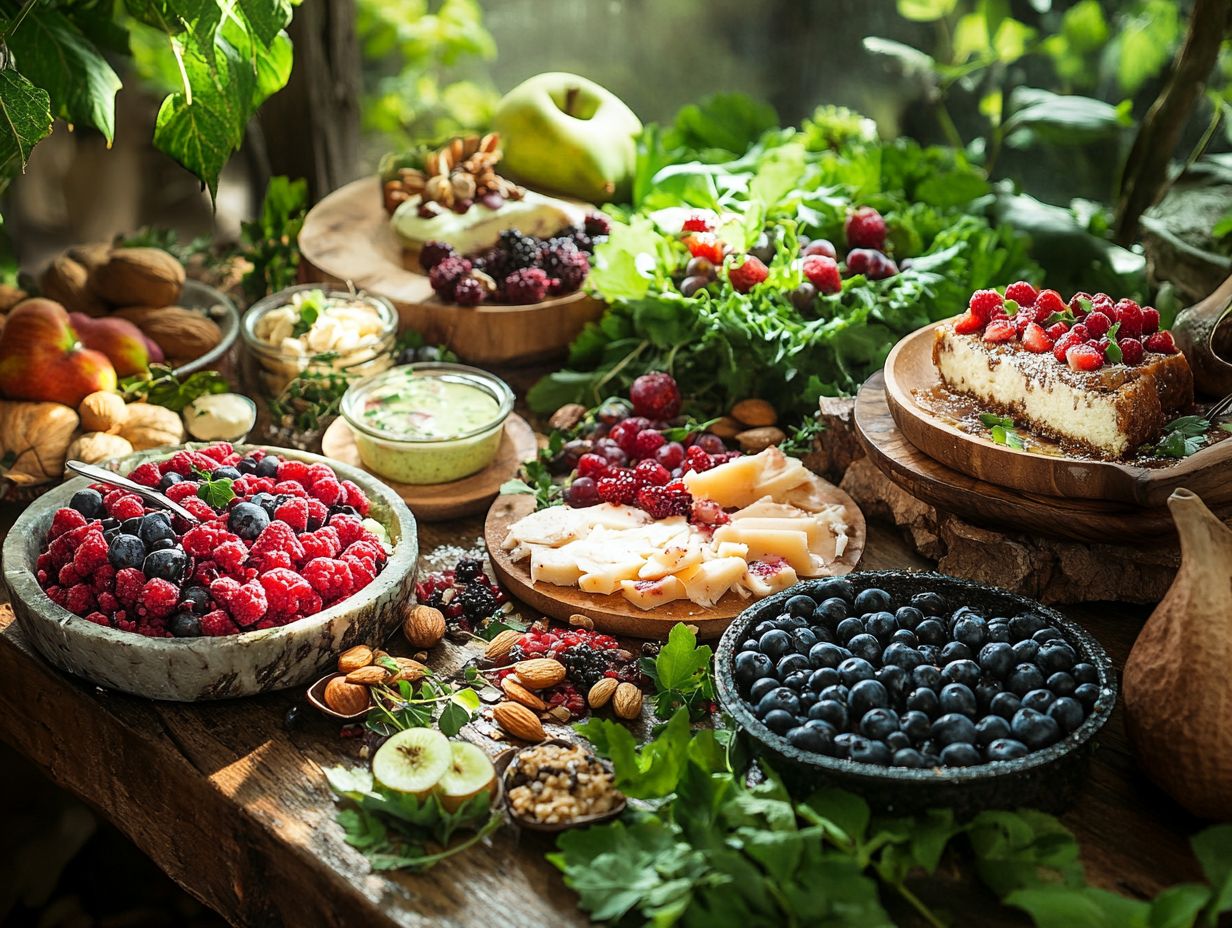
Using locally-sourced ingredients in your dessert recipes not only elevates the flavor but also strengthens your connection with local farmers, promoting sustainability and bolstering the local economy.
When you choose to source produce, dairy, and grains from nearby farms, you unlock an unparalleled freshness that enhances the quality of your treats and supports culinary creativity.
Picture a fruit tart where ripe berries, bursting with flavor, are plucked just hours before they become a luscious filling. Imagine the decadence of a chocolate cake crafted with locally churned butter and farm-fresh eggs; the depth of flavor and richness of texture is simply unmatched.
Moreover, opting for local ingredients means you re reducing the carbon footprint associated with transportation, a crucial step in maintaining ecological balance. By selecting desserts made from locally grown ingredients, you can indulge in delightful creations while feeling good about your contribution to a sustainable food system that truly celebrates the seasons.
4. Homemade Treats
Creating homemade treats gives you complete control over the ingredients, allowing you to embrace eco-friendly practices and customize your sweets to suit your dietary preferences, whether that’s vegan, gluten-free, or something else entirely.
When you prepare desserts in your own kitchen, you re not just crafting recipes that cater to your personal tastes; you re also playing a significant role in reducing the packaging waste that comes with store-bought options. By incorporating organic and local produce, you support sustainable practices while lowering your carbon footprint. Think about simple innovations like fruit-based sorbets or nut-filled energy bars these are fantastic choices when you’re in the mood for healthier indulgences.
Diving into classic desserts like homemade chocolate chip cookies or decadent brownies opens a world of endless variations. You can easily include wholesome additions like oats, nuts, and fresh fruits to elevate your creations. With a few handy tips and tricks, you can enhance your dessert-making skills and relish the satisfaction of crafting something uniquely delicious.
How to Reduce Environmental Impact When Enjoying Desserts
You have the power to significantly reduce your environmental impact when indulging in desserts by making thoughtful choices about ingredients, portion sizes, and consumption habits. By opting for sustainable dessert options crafted from local and organic ingredients, you can minimize your carbon footprint.
Being mindful of food waste also plays a crucial role in promoting resource conservation and creative cooking. Using reusable containers and utensils while savoring your desserts can greatly diminish the environmental toll of single-use products.
Choose sustainable dessert options today to make a difference! Choosing sustainable dessert options is a proactive way for you to reduce your environmental footprint while also enjoying the myriad health benefits of plant-based and whole food ingredients.
By opting for desserts crafted from locally sourced fruits, nuts, and whole grain flours, you can indulge in a delightful treat that not only satisfies your sweet tooth but also nourishes your body. These choices typically feature fewer processed sugars and additives, making them gentler on your digestion and better for your overall health.
Embracing desserts made with sustainable practices not only promotes biodiversity but also supports local economies, creating a ripple effect of positivity. Choosing vegan desserts and dishes made from whole food ingredients like legumes and nuts can also contribute to heart health and reduce the risk of chronic diseases.
These mindful selections enhance your personal well-being while fostering a culture of ecological awareness. As you make these choices, you encourage others to consider the environmental impact of their food choices as well.
2. Reduce Food Waste
Reducing food waste is essential for minimizing your environmental impact, and there are several strategies you can adopt, such as creatively using leftovers in dessert recipes or composting food scraps. Incorporating ingredients like overripe bananas or creating nice cream from frozen fruits are excellent examples of this practice.
By embracing these methods, you not only have the opportunity to create delightful new treats but also contribute to a more sustainable planet. For instance, transforming that day-old cake into a delicious dessert or using overripe bananas to whip up a quick banana bread is a testament to how simple ingredient repurposing can work wonders in your kitchen.
Adopting effective composting practices ensures that remnants from your baking adventures don t end up in landfills, instead, they can enrich the soil and support local gardens. These efforts can lead to reduced waste and tantalizing new flavors, seamlessly aligning your culinary pleasures with a commitment to environmental responsibility.
3. Use Reusable Containers and Utensils
Imagine enjoying your favorite desserts while helping the planet! Incorporating reusable containers and utensils into your dessert consumption habits can significantly reduce your reliance on single-use products, minimizing waste and curbing environmental pollution. This shift also helps reduce the demand for harmful ingredients like palm oil that contribute to deforestation.
This conscious change not only reduces waste in landfills but also aligns you with a broader movement toward sustainability. By opting for durable options, you can savor your favorite treats while actively contributing to the protection of our planet.
Using reusable items encourages a greener lifestyle and inspires those around you to embrace similar practices. Together, you can cultivate a community committed to eco-friendly choices.
Embracing these alternatives can bring both economic and aesthetic advantages. Beautifully designed containers and utensils elevate the entire dessert experience, transforming each occasion into something special and thoughtful.
4. Support Sustainable Brands and Companies
Supporting sustainable brands and companies does more than just contribute to a healthier planet; it sets off a ripple effect, encouraging other businesses to adopt eco-friendly practices in their product lines.
This intentional choice cultivates a cycle of responsibility and innovation that ultimately benefits the environment. By promoting sustainable practices, you can help reduce waste, lower the amount of harmful gases released into the atmosphere, and preserve precious natural resources. When you choose desserts from brands that prioritize sustainability, you’re not just satisfying your sweet tooth; you’re also bolstering local economies that emphasize ethical sourcing and fair labor practices.
Take, for instance, brands like Ben & Jerry s, which use ingredients sourced from fair-trade suppliers and advocate for social justice initiatives. Similarly, H agen-Dazs has taken meaningful steps by sourcing vanilla from sustainable farms, showcasing their commitment to environmental stewardship. By opting for such brands, you become part of a larger movement advocating for transformative change in the industry.
Frequently Asked Questions

What is the environmental impact of raw desserts?
The environmental impact of raw desserts refers to the effects that the production and consumption of these desserts have on the environment. This includes factors such as resource depletion, pollution, and carbon emissions.
How do raw desserts contribute to resource depletion?
Raw desserts often require large amounts of water, energy, and land to produce the necessary ingredients. This can lead to the depletion of resources such as water and fossil fuels, which are not sustainable in the long term.
What types of pollution are associated with the production of raw desserts?
The production and transportation of raw dessert ingredients can contribute to air and water pollution, as well as soil contamination. The packaging for these desserts can create waste and contribute to pollution.
Are raw desserts a more environmentally friendly option compared to traditional desserts?
While raw desserts may use more natural ingredients and avoid some environmental issues such as deforestation for palm oil, they still have a significant impact on the environment. It ultimately depends on the specific ingredients and production methods used for each dessert.
How can I reduce the environmental impact of my raw desserts?
One way to reduce the environmental impact of raw desserts is to choose ingredients that are sustainably sourced and have a lower carbon footprint. You can also opt for homemade desserts using local, organic ingredients to reduce transportation emissions.
What other steps can I take to make my raw desserts more environmentally friendly?
In addition to choosing sustainable ingredients, you can reduce food waste by properly storing and using all parts of the ingredients. Composting any food scraps is also a great way to reduce your environmental impact. Using reusable containers instead of disposable ones can also make a difference.



